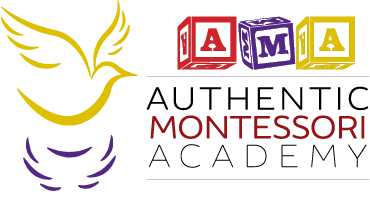Definition of Anaphylaxis
Anaphylaxis is a severe allergic reaction that can be fatal, resulting in circulatory collapse or shock. The allergy may be related to food, insect stings, medicine, latex, etc.
Purpose of the Policy and Procedures
AMA is committed to taking a pro-active position regarding the prevention of anaphylaxis. The purpose of the policy is to provide a process for dealing with anaphylaxis in the school.
Employees, Volunteers, Student Staff
Before beginning employment with Authentic Montessori Academy, all individuals are required to review the Anaphylaxis Policy. They are also required to review it annually thereafter.
Strategy to Reduce Risk of Exposure
- Children with extreme allergies that the school cannot accommodate will be asked to bring their own food from home.
- Foods with “May Contain” nut warnings will not be served.
- All labels will be read by a staff member prior to serving.
- Staff purchasing foods on behalf of the school must read food ingredient labels every time they purchase a product.
- Any persons supplying food to the school will be notified of all life-threatening allergies in the centre. A list of allergies will be revised as necessary.
- All children and staff will wash their hands before and after handling food.
- Children/staff/volunteers will be instructed to not share food.
- All surfaces will be cleaned with a cleaning solution (water and germ destroyer approved by Public Health) prior to and after preparing and serving food.
- All cleaning supplies, medicines, and any other products that may be of danger and/or commonly produce allergic reactions will be stored away.
- Garbage bins will be removed from the room and emptied after lunch.
- Extra special supervision of anaphylactic children during eating (ie. sitting opposite /next to staff) will be provided.
- During field trips, children with anaphylaxis will sit within view of a staff member while on the bus.
- Playground areas will be checked and monitored for insects such as wasps. A custodian will be notified immediately and children will be forbidden to play in this area if an insect danger is detected.
- On off-site trips, parents will be notified and asked to send an extra Epi-Pen.
- Staff will take a cell phone on all excursions.
- Consent by the child’s physician is required for any child carrying their own Epi-Pen.
Communication Plan for the Dissemination of Information
- Parents will be informed by newsletter/handout of all allergies in the school.
- List of allergies will be posted in each room operated by the school and on AMA’s Information Board.
- Parents with children with anaphylaxis will provide an individual plan for their child prior to enrolment.
Individual Plan and Emergency Procedures
Prior to enrolment, the parent/guardian will meet with the Principal and/or Program Supervisor to provide input for the child’s individual plan and emergency procedures. This plan will include but is not limited to:
- Description of the child’s allergy
- Monitoring and avoidance strategies
- Signs and symptoms of an anaphylactic reaction
- Child care staff roles and responsibilities
- Parent/guardian consent for administering allergy medication, sharing information and posting Emergency Plan
- Emergency contact information
- Location of EpiPen and back-up EpiPen
- Physicians note to carry own Epi-Pen
Parents are requested to advise the Principal and/or Program Supervisor if their child develops an allergy, requires medication, and/or of any change to the child’s individual plan or treatment. Individual Plans will be revised yearly and as directed by the parent or physician.
Copies of Individual Plans are in each child’s file, emergency bags, and Policy and Procedures binder and are also posted in every room operated by the school, including the child care office.
The operator will review the child’s individual plan, including the emergency procedure to be followed if the child has an anaphylactic reaction with day nursery staff, students and volunteers, prior to employment or placement and annually thereafter or when there is a change in the individual plan.
Emergency Protocol
- One person will stay with the child at all times.
- One person will go for help or will call for help.
- Emergency procedures, as outlined in child’s individual plan (ie. Administer epinephrine at the first sign of reaction), will be followed.
- Call 911. Have the child transported to the hospital even if symptoms have subsided. Symptoms may occur hours after exposure to the allergen.
- The administered Epi-pen will accompany the child to the hospital.
- The administered Epi-pen is to be given to a hospital employee or the child’s parent for disposal.
- One calm staff member must stay with the child until their parent or guardian arrives. The child’s back-up Epi-pen auto-injector should be taken to the hospital.
Training
- Where a child has an anaphylactic allergy, school staff, students, and volunteers are provided with training from a physician or a parent.
- Training will include the procedures to be followed in the event of a child having an anaphylactic reaction, including how to recognize the signs and symptoms of anaphylaxis and administer medication.
- Any new staff, students, and volunteers who commence employment or placement after the initial training will be given the training by the Principal/Program Supervisor or parent.
- The Principal/Program Supervisor will be trained by the parent or physician of the child annually and receive consent from the parent to train new staff, students, and volunteers.
- Volunteers and students are not permitted to administer medication unless under extreme circumstances (ie. staff member is unconscious).
- Staff will conduct a check to confirm child (ren) have their required medication with them before each transition (ie. moving from the class to the gym, leaving the school, etc.).
- The staff will be required to sign and date that they have received training.
- AMA will keep a log on file of all training dates, trainers, and staff signatures.
